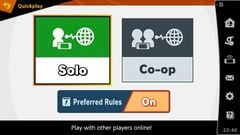| Welcome to SmashWiki! Log in or create an account and join the community, and don't forget to read this first! |
| Notices |
|---|
| The Skill parameter has been removed from Smasher infoboxes, and in its place are the new "Best historical ranking" and "Best tournament result" parameters. SmashWiki needs help adding these new parameters to Smasher infoboxes, refer to the guidelines here for what should be included in these new parameters. |
| When adding results to Smasher pages, include each tournament's entrant number in addition to the player's placement, and use the {{Trn}} template with the matching game specified. Please also fix old results on Smasher pages that do not abide to this standard. Refer to our Smasher article guidelines to see how results tables should be formatted. |
| Check out our project page for ongoing projects that SmashWiki needs help with. |
Quickplay
Quickplay is a an online mode in Super Smash Bros. Ultimate that allows people to fight other people through the internet. It is the successor to Smash 4's online mode and involves fighting random opponents without most of the frills found in other online modes.
Overview
Quickplay has two game modes: Solo and Co-op. Solo allows players to play in 1v1 matches against other players with similar Global Smash Power and within the same region of the world, ensuring the most fair fight and most stable connection possible, though this outcome is not always possible depending on circumstances like population density and time of day. When one of the player's characters reach a certain amount of GSP, Solo mode becomes Elite Smash, but only for that character. If all the characters lost the Global Smash Power to qualify for Elite Smash, the mode returns to normal Quickplay. The higher every one of someone's characters' Global Smash Power, the higher the player's roster GSP will be, which increases the amount of Global Smash Power a character they haven't played yet will start out with. This system makes it easier for people who already have characters in Elite Smash to get more in. Co-op is mostly the same but allows two players on the same console to play online doubles against other Co-op teams. The game combines the GSP of both players for its matchmaking and pairs them with groups of similar collective GSP. Elite Smash is not used for Co-op due to the logistical issues of one player being kicked from Elite Smash while the other remaining after a match.
If the network connection of a player is unstable, a message will pop up and not allow quickplays. If a player disconnects during a match, their GSP will be lowered and they will receive a warning when they reopen the game. On the opponent's side when a player disconnects, the game will freeze and a loading icon will appear for a few seconds, the disconnected player will be replaced with a CPU and they will receive no GSP when the game ends, regardless of whether or not they beat the CPU. In the case of repeat offenses of disconnecting, as well as the game detecting behavior such as inactivity during battles, continuously self-destructing, ganging up on a single player in a free-for-all match, and inappropriate nicknames, guilty parties are temporarily suspended from Quickplay, Online Tournaments, and Battle Arenas, and each subsequent suspension time gets longer the more times a player is caught doing these things.
Unlike other modes in Ultimate, it is impossible to taunt in Quickplay, including the characters that have their taunt as an attack (i.e. Luigi and Kazuya). The only exception to this is Kirby, who can taunt when he has a Copy Ability in order to discard it. This restriction is likely present in order to prevent taunt matches (even though taunt matches do not necessarily require taunting) and mitigate potential toxic player behavior taunting enables.
Preferred rules
Unlike its predecessor, Solo mode does not include dedicated For Fun or For Glory sections. Instead, players can set a preferred ruleset before selecting a mode. This ruleset allows users to have a higher chance of fighting opponents who have a similar ruleset, although this is not guaranteed. Preferred rules can also be turned off, which allows the player the largest pool of potential opponents, but with no control over what the rules of the game will be. During the game's launch, there were many complaints from players because they were not entering matches with the ruleset they wanted; however, the game has since been updated to more commonly place players in 1v1 matches if they set 1v1 as their preferred rules.
Preferred rules include the following:
- Three formats are available: Smash (Free-For-All), Team Battle, or 1-on-1.
- Three rules are available: Time, Stock, and Stamina.
- Time allows for matches with the times 2:00, 2:30, and 3:00.
- Stock allows for matches lasting 3:00, 4:00, 5:00, 6:00 or 7:00, with 1, 2 or 3 stocks.
- Stamina allows for Stock matches with each stock having 100, 150, 200, 250, or 300 HP.
- Five stage options are available: A random stage, a random stage with hazards off, a random Battlefield form, a random Ω form, and Small Battlefield (since update 8.1.0).
- Since update 3.1.0, FS Meter can be toggled.
- The following five item groups can be toggled on/off: Smash Balls, Assist Trophies, Poké Balls/Master Balls, Dragoon/Daybreak pieces, and all other items. Prior to update 3.1.0, Special Flags were another item group.
Update history
1.1.0
- Added Quickplay as part of the day one patch.
1.2.0
- When matchmaking in Quickplay, Preferred Rules will be more highly prioritized.
3.0.0
- It is now easier to be matched with players who have a similar Global Smash Power in Quickplay.
